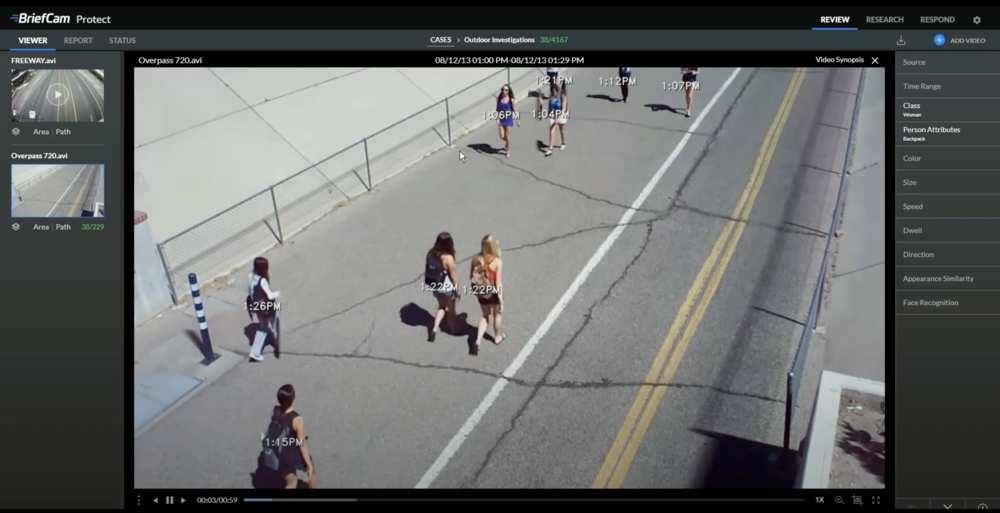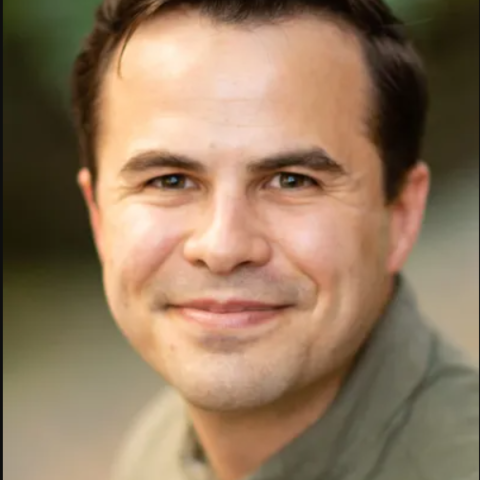
Section Branding
Header Content
What to know: New Savannah Police technology can ID suspects by clothes, license plates
Primary Content

Last month, with little fanfare, the Savannah City Council unanimously approved funding for new video surveillance technology and cameras to aid police in fighting crime.
Savannah Police Department officials say the software from the Israel-based company, BriefCam Ltd., will help detectives sift through hours of surveillance footage in mere minutes. The program can identify suspects or persons of interest by clothing, their license plates, vehicle type and color – all by searching keywords. That information can then be used to obtain search and arrest warrants.
BriefCam, founded in 2007 by Hebrew University researchers, was purchased by the Japanese camera corporation Canon Inc. in 2018.
Its video analytics program is employed by several police departments in cities across the country, including Hartford, C.T., Beverly Hills, C.A., Chicago, Detroit and New Orleans. Airports and “smart cities” are also listed as BriefCam customers.
Savannah Police Assistant Chief Robert Gavin, who spearheaded BriefCam’s approval in Savannah and interacted with BriefCam’s law enforcement salesman, Tim Convery, praised the new capability.
“BriefCam’s efficiency provides SPD with the ability to enhance its provision of law enforcement services in Savannah. Due to these factors, we believe this tool will improve public safety,” Gavin said.
The program will cost the city $149,072 for the camera installation and software. There will also be an annual cost of $18,000 for continued use, according to budget documents.
On Sept. 30, The Current contacted Savannah Police requesting an interview with Gavin. However, police spokesperson Bianca Johnson said Gavin was unavailable for an interview due to his busy schedule.
The Current sent questions to Johnson over email. On Oct. 20, Johnson responded with answers to the questions and said they were provided to her by Gavin.
Gavin described the new technology as being useful to investigate any type of crime in Savannah. He said the police will be careful stewards of the information that is stored by the new equipment. The Savannah contract does not include BriefCam’s facial recognition feature, for example. As well, the BriefCam technology does not allow searches based on skin color or tone, Gavin said.
Ben Lynde, Policy Counsel for the American Civil Liberties Union of Georgia, expressed concerns about the potential for implicit bias in favor of technology. In terms of BriefCam, that could create overreliance on the tool and less incentive for detectives to corroborate evidence, he said. He also criticized Savannah officials for declining to release the locations of the cameras, at a time when other police technologies, like ShotSpotter, have come under fire for being overly concentrated in communities of color.
“If they’re going to use this huge technology that has this powerful ability to explore the (comings and) goings of people’s lives, they should be more transparent with communities about where they’re doing that, and what their priorities are and why they put cameras where they did,” Lynde said.
The Current’s questions and Assistant Chief Gavin’s written responses are in full below:
The Current: Is construction and installation underway for BriefCam’s 100 cameras?
Gavin: “The process begins when City Council approves an agenda item. The City Manager is then authorized to execute the contract with the vendor. Next, Purchasing transmits a Purchase Order to the vendor. This is the current stage of the project. BriefCam has ordered the components needed for installation. Once those components arrive and are installed, the company will train SPD staff on use and supply log in information to department users.”
TC: The facial recognition component of BriefCam — does it cost extra money or is it a feature SPD has access to and is choosing not to use?
G: “As stated in our presentation to City Council, BriefCam will not be used as a proactive monitoring device by the department. It was purchased as a tool to promote efficiency and effectiveness. SPD does not have a real time crime center, meaning that we do not actively monitor city cameras. Absent such monitoring, the facial recognition component provides no benefit to us at this time. To be clear, BriefCam will be utilized after an incident occurs: Authorized users will review location-specific camera footage, which could include multiple cameras if a subject was mobile.
Until this purchase, detectives had to review multiple cameras in real time to locate a subject(s), which amounted to a tremendous expenditure of officers’ time and resources. With BriefCam, officers can input specific descriptive data and obtain isolated potential matches from up to 100 cameras, e.g., identifying license plates, matching vehicles, or clothing information provided by witnesses. BriefCam can perform searches and return results within minutes. Authorized users, which are primarily detectives, then review those results, saving hours of search and retrieval work. BriefCam’s efficiency provides SPD with the ability to enhance its provision of law enforcement services in Savannah. Due to these factors, we believe this tool will improve public safety.”
TC: If SPD is choosing not to, why? What circumstances would warrant using it?
G: “The facial recognition feature requires inputting data into a photo database, something for which we have not obtained permission. As stated above, should circumstances change, public feedback will be solicited and considered prior to utilization.”
TC: If it costs extra money, are there plans in the future to get access to it?
G: “We have neither requested nor budgeted money for this feature in 2023.”
TC: Is there a process and notification to citizens when BriefCam is utilized?
G: “No. It is a post-incident investigative tool. It will be used just as City cameras have been used for years (and more recently, school zone cameras) by review when there is a public safety need. In addition, BriefCam’s video analytic technology will be used in accordance with Georgia and federal laws, including civil rights protections. As with any technology, SPD will conduct audits to ensure the proper balance between privacy, data protection and security through transparency and proper guidelines for use of the software.”
TC: BriefCam has the capability for officers to identify descriptions of individuals and vehicles they are searching for and group together hours of surveillance footage with just those targets in them. What’s the length of time the image data is stored?
G: “The footage has the same retention time as city cameras. If we do not review footage and/or extract potential evidence within three days, the footage is deleted. Once reviewed and if determined to have evidentiary value, it is held the amount of time that is dictated by the state for retention purposes. Just as with any other digital evidence from cameras, if it has evidentiary value, the digital image is collected and logged. All other video that has no evidentiary value is deleted.”
TC: Where and by whom is the image data stored? Who/What parties have access to the stored data? Is there a written protocol and training for using it and informing the public that it’s being taken, who can request access and how it can be used?
G: “BriefCam does not store individual’s personal information. BriefCam’s software is a General Data Protection Regulation (GDPR) compliant product that includes instruction for users on compliance through data management practices. These are the same federal and state regulations that govern any other police-sensitive information such as criminal histories, vehicle registrations, dates of birth and social security numbers.
SPD investigators, analysts, forensic technicians, precinct supervisors, specialized unit supervisors and commanders will have access to BriefCam. All will have been trained on use, and access will be through individualized log in. The program includes audit trails identifying those who log in and what was used, viewed, collected, and when the system is utilized in any such manner. BriefCam may also be utilized by Traffic Engineering for other applications such as traffic control purposes and analysis.”
TC: Does BriefCam’s video technology only work on image data gathered by the 100 BriefCam cameras in Savannah or will it work on any video footage SPD has?
G: “It will work on 100 cameras selected by SPD. Extension to other cameras will require an additional purchase.”
TC: Is SPD using the “watchlist” or “alerts” function of BriefCam, wherein officers will be alerted when a certain individual or vehicle they are tracking reappears on video surveillance?
G: “BriefCam uses the term ‘watchlist,’ which essentially is the same as what law enforcement refers to as ‘Be On The Lookout’ or BOLO. In instances of missing children and dementia patients, camera footage may be reviewed quickly with BriefCam, which we believe to be a vital public safety service.”
“With respect to vehicles this is another way to be where officers cannot. BriefCam, our FLOCK cameras, stationary License Plate Readers (LPRs), speed trailers and patrol cars with mobile LPR’s receive these alerts, which notify officers of vehicles involved in suspected crimes, stolen cars and suspects. BriefCam will enhance our currently available technological tools and will be employed no differently than existing technological resources.”
TC: At what stage of a criminal investigation can officers use BriefCam? Which SPD officers get access to it (detectives or supervisors or beat cops)? It may be used as soon as an incident occurs and at any phase of an investigation.
G: See #5.
TC: Do you need a warrant to use BriefCam in relation to a specific person, residence or vehicle? Can information gathered through BriefCam be used in warrants for arrest and/or searches?
G: “No warrant is required. Evidence obtained from BriefCam may be used to apply for search or arrest warrants. A judge will determine whether probable cause exists to issue a warrant.”
TC: What conversations have been held with the DA’s office and judicial circuit members to acquaint them with the software and solicit advice on its legal usage? Do they know about it, how it’s used and the intent to use it?
G: “No conversation is necessary because BriefCam simply provides enhanced searching services for our camera system, which is already in use. The evidence is the same whether collected through BriefCam or by an investigator personally reviewing footage.”
TC: What factors are SPD able to track using BriefCam? License plates, clothing, bodies, skin color? How are the factors determined and entered into the system? Who decides that?
G: “Utilizing information provided by witnesses and/or victims, SPD can employ BriefCam to search for a particular person’s clothing, specific vehicles and license plates. The information viewed or provided is put into the program and any matching search results will be reviewed by the program in a matter of minutes, providing SPD with actionable intelligence almost immediately. BriefCam does not permit searches based on skin color or tone.”
TC: What training have investigators and officers been given on the software capability?
G: “No training has been received yet, as the program and equipment is not installed. The cost includes Department training on use. See #1 for the timeline.”
TC: Who owns the data and how is it policed and erased after the holding time? Who set the holding times?
G: See #5.
TC: Where are the new cameras located? If you cannot disclose that, why not?
G: We do not disclose camera locations under O.C.G.A. § 50-18-72(a)(25)(A).
This story comes to GPB through a reporting partnership with The Current.

